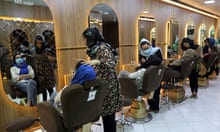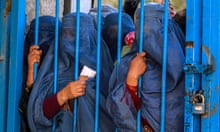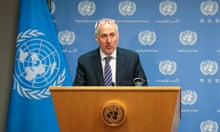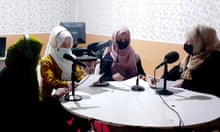Afghan journalists and rights activists have condemned “religious guidelines” issued by the Taliban that restrict the role of women in television, as the Islamists move to muzzle the media.
The Ministry for the Promotion of Virtue and Prevention of Vice on Sunday called on broadcasters to stop showing dramas and soap operas featuring female actors.
It also told broadcasters not to screen films or programmes that are “against Islamic or Afghan values” and asked female television journalists to wear a hijab at work.
Zan TV, the first Afghan channel staffed exclusively by female producers and reporters, tweeted that the guidelines threatened media freedom and would reduce the presence of female journalists.
The Taliban’s interpretation of the hijab – which can range from a hair covering to a face veil or full body covering – is unclear, and the majority of Afghan women already wear headscarves.
The attempt to regulate the media comes three months after the Taliban swept back into power.
Hujatullah Mujadidi, a founding member of the Federation of Afghan Journalists, said if applied the guidelines would force “some media outlets, especially television, to stop working”.
Many shows rolled out to fill TV schedules, notably soap operas produced in India and Turkey, will be inappropriate under the guidelines, making it difficult for channels to generate enough output and retain audiences.
A ministry spokesman said after the announcement that the measures amounted to “religious guidelines” rather than rules.
But Qari Abdul Sattar Saeed, a media spokesperson for the Taliban prime minister, days earlier accused the Afghan media of conveying propaganda for the “enemy” and said they should be treated harshly.
Aslia Ahmadzai, a journalist in exile, said female journalists “will feel threatened” by the measures.
Another exiled Afghan journalist, who wanted to remain anonymous, described the guidelines as “the first step to banning the TV altogether, just like in the 90s”.
During the Taliban’s 1996-2001 stint in power, there was no Afghan media to speak of – the Islamists banned television, films and most other forms of entertainment, deeming them immoral.
Despite insisting they would rule more moderately this time around, the Taliban have introduced rules on what women must wear at university.
Taliban members have also beaten and harassed several Afghan journalists covering protests despite promising to uphold press freedoms.
Human Rights Watch condemned the guidelines. “The new media regulations and threats against journalists reflect broader efforts to silence all criticism of Taliban rule,” said Patricia Gossman, an associate Asia director at the organisation.
Many journalists were living in fear because of threats, the rights group said. It alleged “Taliban officials … have required journalists to submit all reports for approval before publication”.









